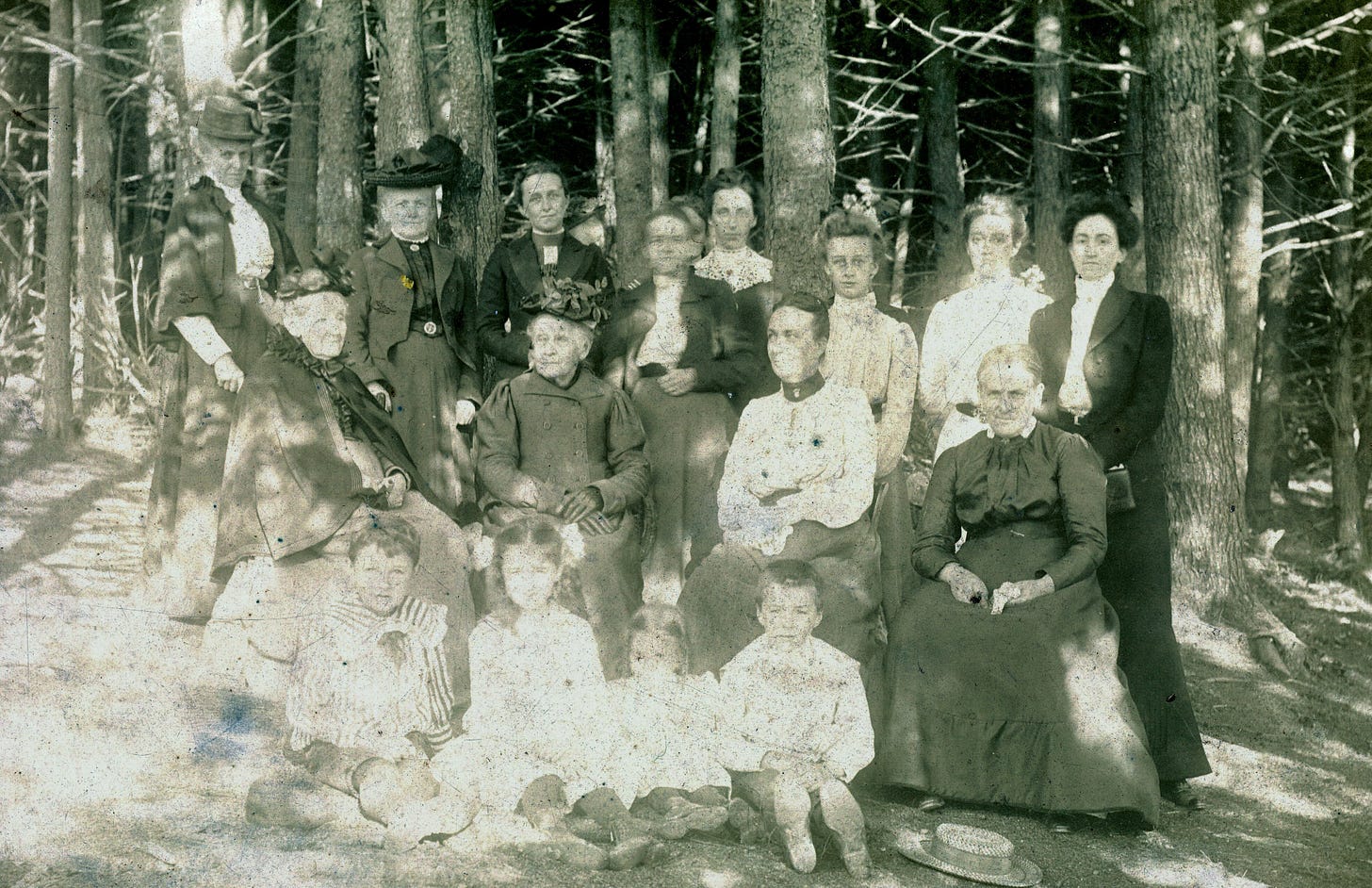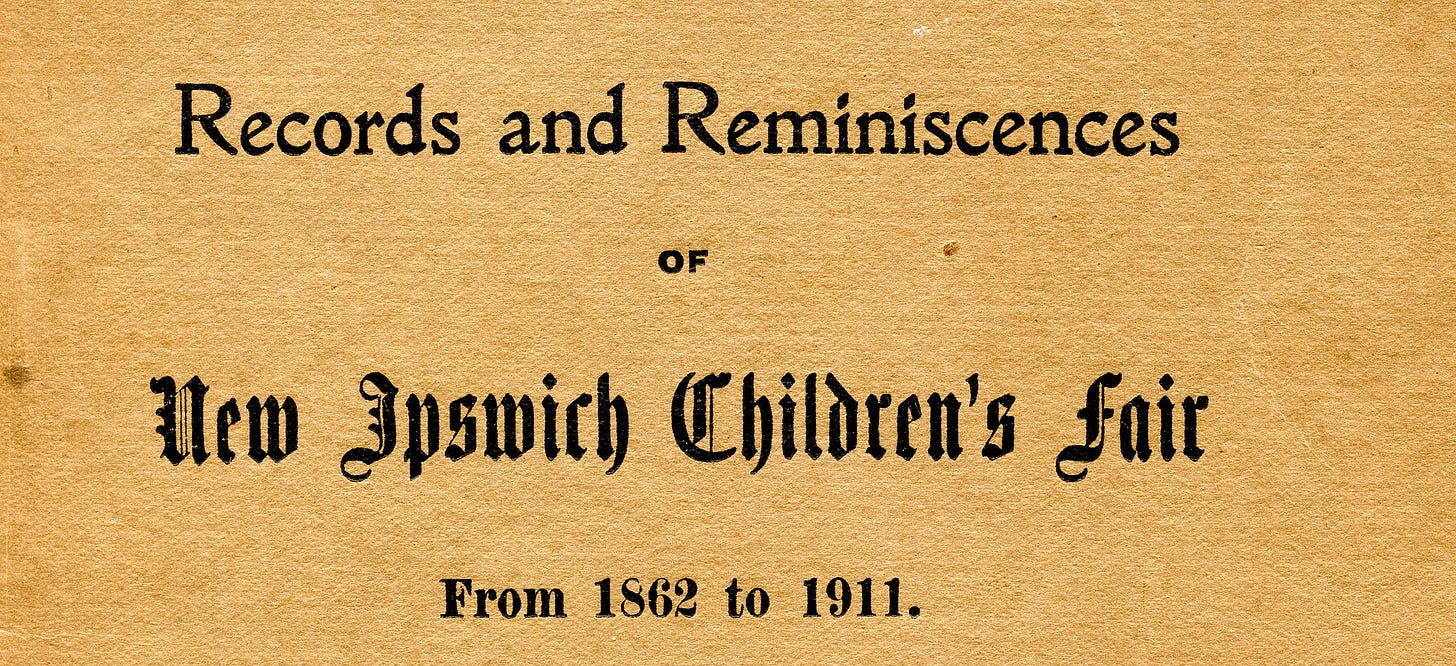Group Photo
Back Row - Emma Wheeler, Mrs. Myron Taylor, Ella Walker, Nettie Whittemore, Abbie Howe, Lena Walker. Second Row - Mrs. Clark Ober, Caroline Francis Jones, Mrs W. O. Cabett, Mrs. S.E. Howe. Seated Arthur Wheeler, Unknown, May Haldah Howe, Milton Howe

On this day - July 27, 1908
James Roger diary entry
27th (Monday)
Fair and sunny. Cool N.W. wind. David at Ashburnham. I picked 3 chicks and trimmed 4 rows of turnips in forenoon and played golf in afternoon with John Cummings. Alice and Jessie picked blueberries in forenoon. Got letters from Hamish and Wentworth & Co.
On this day - July 27, 1897
William Jurian Kaula diary - search for “real truth”
Our outward history for the past few weeks has remained unchanged. We suffer occasionally from ennui but on the whole I am very contented and thoroughly enjoy being away from the crowd - from the overpowering bustle of the city life where life seems so intense and energetic that you must be in the swim and work - no matter about the kind but it is work. It is a continuous charm in the country to be able to follow your own inclinations, ideas, and impressions, according to your own free will, unhampered and not restricted by the advice and influence of those who are laboring in totally different directions. Fortunately art is more a question of individual effort. Advice and wholesome criticism of course we need from older men. We help each other much but not openly. There is no flattery or acknowledged successes. An unkind word, or a mistaken meaning would excite hostilities and lengthened argument so common among art students. In ______ problematic ends in the search for truth, color, and values criticim [sic] is valuable and also in cultivation of taste in selection, arrangement, appreciation, and constant alertness for the search for the new and old reconized [sic] truths. Often times a good critism [sic] tells us what we may have known for some time - the same things are repeated over and over again until we know the hackneyed phrases all by heart, know them thoroughly, except in execution. Modern French art is mostly a great struggle for technical finish, dazzling execution, novel ideas, renovation without end, no matter how questionable the choice - be it a slaughter house or scene in Hades, the manner in which it is presented - in execution - that is the end and aim. This is the French passion for vraie vérité.* "Toute vérité nice et crue ná pas assez passé par l'âme,"** says Joubert.
* vraie vérité = real truth
** Toute vérité nice et crue ná pas assez passé par l'âme = Any nice and raw truth hasn't passed through the soul enough
Records and Reminiscences of the New Ipswich Children’s Fair from 1862 to 1911
By Mrs. C. H. Obear - Pages 42 - 44 (Accounting)
I will now take you to the room where the general committee who had charge of this fair are gathered to "settle up" the accounts of the fair. At the time agreed on they come to the home of one of their number as being central for all of them.
Let me picture for you, dear friends, the proceedings of this little company who the week before managed the fair with no fixed rule of procedure, but governed only by precedent. If you stand looking into the room where they have met, you recognize every one of the individuals who sit around a large table on which are placed writing materials, various parcels of money, books of accounts, and a large sheet of paper across the top of which are written names of various benevolent institutions. The party informally agree on a division of the work to be done. From the pile of "small change" sent in from the auction and other tables, two make piles of each denomination ready to be counted, another smoothes out and counts the paper money, Dea. J. P. Clark (do you remember him better as Col. John P. Clark?) has the auction clerk's book before him and reads. from it aloud designations and prices received, of the articles sold. Mrs. Obear sets these down on the large sheet before her, mentioned as one of the equipment of the table around which they sit. When all are set down under their respective heads the sums are counted.
Mr. Clark runs up the line, Mrs. Obear down, to save time. Ile is a quick and accurate accountant, her figures agree with his, and the rest of the company pause to listen to the amount, and express their pleasure or regret, generally the former, for we know that the sums raised do not come from homes of wealth, but from plain working people who earn their money. The members of the committee resume their work.
Meanwhile another two have reckoned the expenses of the fair. The expenditures are small, the friends of the institution contribute nearly all that is needed-the posters, expense of sending the proceeds away through the post-office, etc. This last has been done by Mrs. C. H. Obear, and succeeding her, by Mrs. Charles (Nellie) Wheeler for these fifty years. As you stand looking into this room and see that they are all friends of many years of the past, as they finish their work it is pleasant to you as to me to look again on the faces of your co-partners in this Christian labor, as my touch brings them from their slumber in your memory. Oh, no! we never lose the Past! Its scenes are never blotted out or wholly effaced, but in some minds so deeply imprinted, a light touch of the key opens the place from whence they wait to be called !
No matter whether from the haunts of childhood, or heights of middle life, or the descending slopes of old age, they are there! And friends, for whom I write this little book (you for whom I write it are all friends), will they die, "in the land to which we go," or shall we look back on the way the Lord our God has led us? Shall we know the influence the persons and associations of our earth-life have had on our home in the "Mansion prepared for us in one of the many mansions of the Father's house?"
Oh, wonderful power of Memory and its hidden pictures! How vivid and clear are the faces and forms of those with whom we mingled in the "long ago!" And where are they? Some yet with us; some parted by many a mile; some across the sea; and on some
"The mossy marble rests
On the lips that we pressed,
In their bloom,
Have been carved full many a year,
On the tomb."



